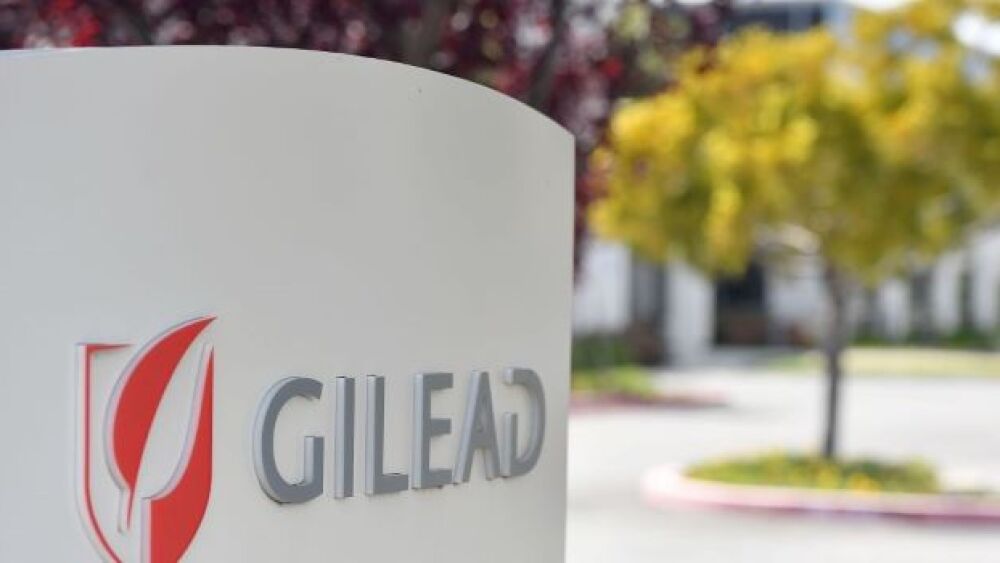Gilead snapped up U.K.-based MiroBio in a $405 million deal that will bring its checkpoint agonists and discovery platform under Gilead’s umbrella.
Josh Edelson/AFP via Getty
Checkpoint inhibitors, such as Merck’s Keytruda, have demonstrated a powerful effect on the body’s immune system in the fight against tumors. Gilead Sciences is banking on a differentiated approach with checkpoint agonists in its ongoing crusade against autoimmune diseases. On Thursday, the California-headquartered company snapped up U.K.-based MiroBio in a $405 million deal that will bring its checkpoint agonists and discovery platform under Gilead’s umbrella.
Checkpoint pathways play a significant role in regulating immune cell function. Through the checkpoint agonists, MiroBio aims to harness the natural control mechanisms within the immune system and “restore the balance” within the body, keeping these diseases in check.
MiroBio and Gilead believe they can offer new, best-in-class assets to patients beset by different autoimmune diseases. The deal includes MiroBio’s lead investigational candidate, MB272, a selective agonist of T, B and dendritic cells that aims to inhibit or blunt activation and suppress an inflammatory immune response. Earlier this week, MiroBio, which was founded three years ago, dosed the first patient in a Phase I study with the B- and T-lymphocyte Attenuator (BTLA) targeting asset.
Multiple Suitors Taking Notice of MiroBio
Eliot Charles, Ph.D., chairman of MiroBio, told BioSpace he was pleased with the progress the company has made since it spun out of the University of Oxford in 2019. It’s that progress that has attracted the likes of Gilead, a leader in treating autoimmune diseases. Charles shared that about a year ago, MiroBio began to talk with other companies after seeing positive data from its developmental agonist programs. That data received a significant amount of recognition from these companies, he said.
During the course of those talks, Gilead took notice of the company and Charles said it didn’t take too long before the two realized how well they could serve the patient communities by combining forces.
“We’ve been able to demonstrate what the leading assets in our platform can do and that has drawn the attention of other companies,” Charles said. “MiroBio has a deep understanding of checkpoint receptor signaling and a proprietary approach to select and generate superior agonist antibodies. Combining this with Gilead’s drug development and therapeutic area expertise will allow us to fully explore the potential of checkpoint agonist antibodies for patients with autoimmune disease.”
Flavius Martin, EVP of research at Gilead, touted the research conducted at MiroBio. In a brief statement, Martin said the company researchers have “spearheaded foundational research for agonist antibodies following a rigorous scientific approach.” Martin added that Gilead believes MiroBio’s platform technology will be able to produce best-in-class agonist antibodies targeting immune inhibitory receptors.
The Broad Potential of BTLA Agonists
MiroBio isn’t the only company focused on BTLA. Eli Lilly is assessing a BTLA-focused candidate in a Phase II study in lupus erythematosus. Earlier this year, San Diego-based AnaptysBio announced positive top-line data from a Phase I study of its anti-BTLA agonist antibody, ANB032.
MiroBio’s MB272, which has potential applications in multiple autoimmune diseases, was developed with the company’s I-ReSToRE (REceptor Selection and Targeting to Reinstate immune Equilibrium) platform. The platform, Charles said, is used to develop potential best-in-class agonist antibodies targeting immune inhibitory receptors, of which there are approximately 70.
He noted that what immuno-oncology-focused companies have been able to accomplish with the inhibition of checkpoints shows how important they are to human health. By using the company’s proprietary agonists to unlock the potential of the checkpoints in order to dampen an overactive immune response, Charles speculated that the assets will be able to generate leading responses in multiple disease indications.
“There are more than 70 receptors that have differential expression patterns,” he said, adding that this leads to numerous opportunities for the company.
He said the I-ReSToRE platform supports the identification and development of therapeutics that use inhibitory signaling networks to understand the role of the receptors in various disease states. However, what autoimmune diseases Gilead has in mind for the MiroBio platform remains to be seen. In addition to supporting the continued development of MB272, the company intends to advance MB151, a PD-1 agonist, as well as other early-stage programs over the next few years.
Over the coming weeks, Charles said MiroBio will sit down with Gilead to talk about the different assets and “share ideas” on which disease indications they could be aimed at. However, he said with the acquisition having just been announced, he is not sure of a potential timeline for that discussion.
The small company is well-funded. In June, MiroBio secured $97 million in a Series B financing round to support the development of MB272 and MB151 and its I-ReSToRE platform. That series B was backed by a strong group of trans-Atlantic investors, including Oxford Science Enterprises, Samsara BioCapital, SR One, Medicxi, Advent Life Sciences, OrbiMed and Monograph. The company launched with a $34 million Series A.
In conclusion, Charles said, “I’m really excited that MiroBio will become part of Gilead Sciences I will be keenly focused on getting the integration right.”





